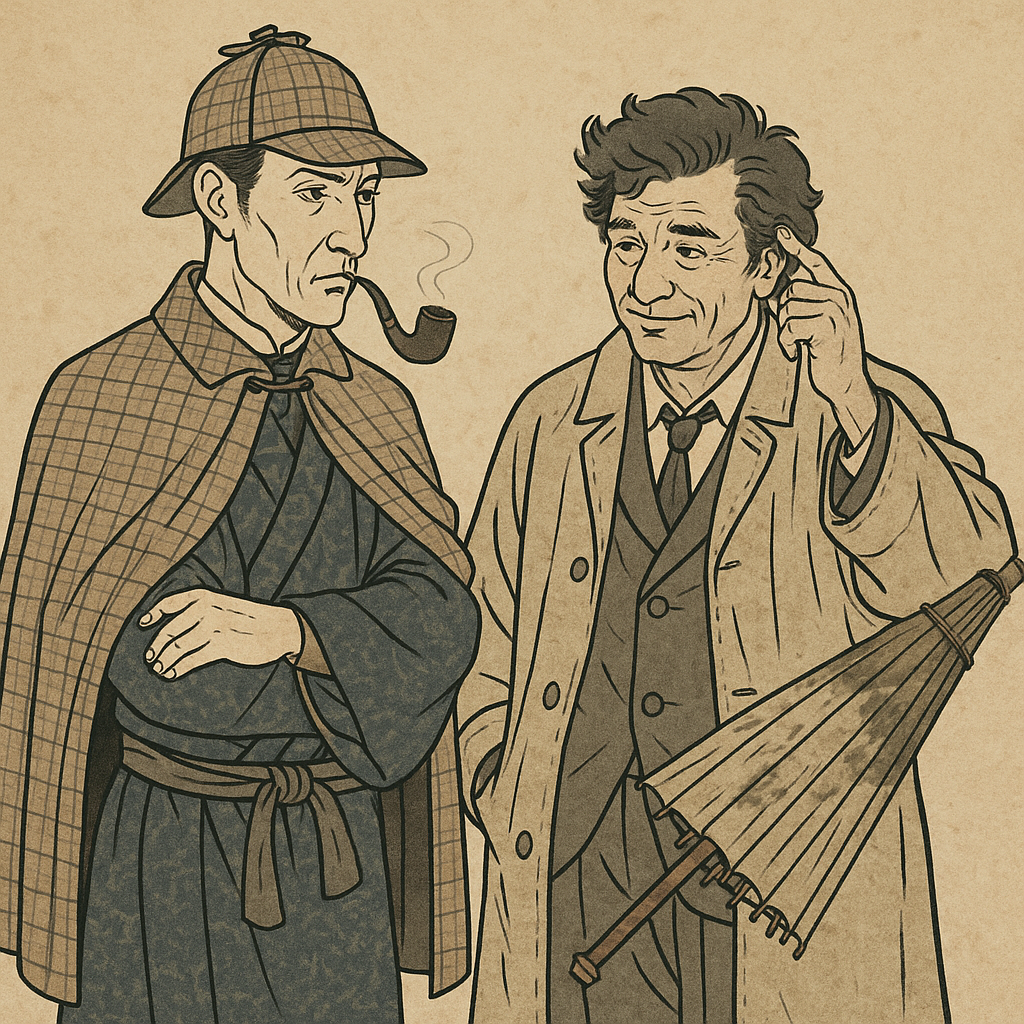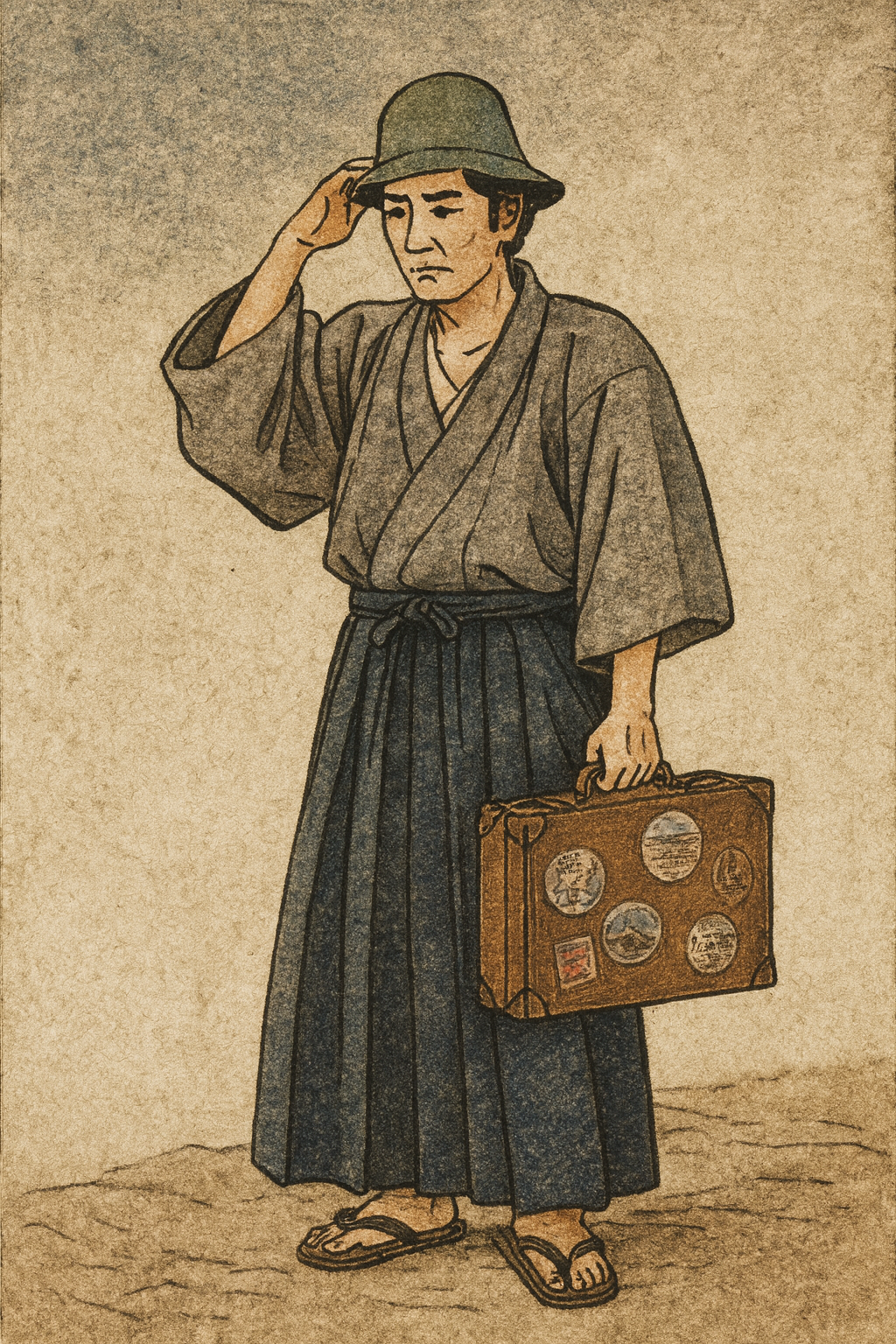In my teaching, I find myself pulling examples from pop culture a surprising number of times. The other day it was a famous detective that came to mind — which leads to this post. Are you a Sherlock Holmes person or a Columbo person?
That question says more about your personality than you might think. It’s not just about trench coats or tweed, it’s about how you think, what you value, how you move through the world, and whether you prefer the chase or the trap.

The Setup vs The Reveal
Sherlock Holmes walks into a room, scans the dust on a hat brim, and deduces your recent affairs, your favorite brand of tobacco, and the last four stops you made on your way there. We follow along, marveling at how quickly and precisely his mind works. With Holmes, the pleasure is in watching someone smarter than us.
Columbo, on the other hand, shows us the murder in the first five minutes. There’s no mystery. No whodunnit. The joy comes from watching this odd, shuffling man lull the killer into a false sense of control, and then slowly tighten the noose. With Columbo, the pleasure is in watching someone underestimated outplay someone who thinks they’re the smartest in the room.
Holmes is about revelation. Columbo is about entrapment.
Logic vs Psychology
Holmes is almost inhuman in his logic. He claims to erase unnecessary information from his mind (the Copernican model of the solar system, for instance) to avoid clutter. He’s a brain on a stick, often detached from emotional nuance.
Columbo, by contrast, is pure psychology. He pretends to be forgetful, overly polite, even a little incompetent. But that’s bait. He uses human weakness — arrogance, guilt, overconfidence — as his weapon.
Where Holmes dissects the world with a scalpel, Columbo digs under your skin with a spoon, a smile, and a “Ohh, sorry to bother you, just one more thing”.
Who They Fight
Another way to look at it: Holmes typically faces the underworld. These are criminals, con men, and killers who operate from the shadows. Columbo faces the overworld: wealthy CEOs, TV personalities, scientists, artists. It’s always someone powerful, polished, respected. Someone who thinks the system will protect them.
Columbo is the system, but in a raincoat. A working-class everyman who pokes holes in the polished lies of the rich. The real twist is not the murder; it’s that justice still works this time.
Fans of Each
People who admire Holmes often appreciate intelligence, analysis, and problem-solving. They like puzzles with elegant solutions. They want to feel the thrill of enlightenment.
People who admire Columbo often appreciate subtlety, justice, and psychological gamesmanship. They like stories where the villain’s pride becomes their downfall. They cheer for the slow burn.
There’s no right answer. But it’s telling which one you want to spend more time with.
You can probably guess where I come down. Though I do enjoy watching or reading Holmes in action, there is nothing quite like watching Columbo at work. No doubt part of that is the incredible Peter Falk, but the character is strong enough that even another actor would have no trouble making him shine.
Echoes and Offshoots
And that’s just it. Both Columbo and Holmes are models — archetypes. And the Holmes and Columbo archetypes didn’t stop in Baker Street or on the Universal backlot — they echo through decades of TV detectives.
Jessica Fletcher, of Murder, She Wrote, mostly channels Holmes: sharp-eyed, deductive, and composed. But she had her Columbo moments, letting the suspect monologue a bit too confidently before gently pricking their balloon.
Ben Matlock leans Columbo: the folksy Southern lawyer who lures you into thinking he’s just a country bumpkin in a seersucker suit, right before he pulls the rug out in the courtroom.
Monk, too, is a curious hybrid. He’s obsessive like Holmes, but his social awkwardness and unpredictable methods give him a strong Columbo flavor, especially when he disarms suspects by simply being himself.
Even Veronica Mars danced between both camps. She had Holmes’s wit and cynicism, but her emotional manipulation and underdog grit? Pure Columbo.
Japan has perhaps even more love for Columbo than we do in the West. His personality and MO are very endearing to the Japanese public. Japan has many homegrown detectives too, but one I’m especially fond of is Kosuke Kindaichi, a man who comes off as a distant cousin of Columbo, with his unkempt hair, frumpy mannerisms, and mumbly, awkward demeanor. He stumbles around until he doesn’t — and then it’s already too late for the killer.

Holmes and Columbo aren’t just characters: they’re templates. And once you see the split, you start seeing it everywhere.
Final Thoughts
Both detectives are legends, but their styles, and worldviews, are miles apart. Holmes dazzles us with precision. Columbo disarms us with charm. One represents the Enlightenment ideal of reason; the other, the post-Watergate suspicion of power.
So… which are you?
Are you a Sherlock Holmes person or a Columbo person?
❦
 |
David is an American teacher and translator lost in Japan, trying to capture the beauty of this country one photo at a time and searching for the perfect haiku. He blogs here and at laspina.org. Write him on Bluesky. |
Posted using CineTV